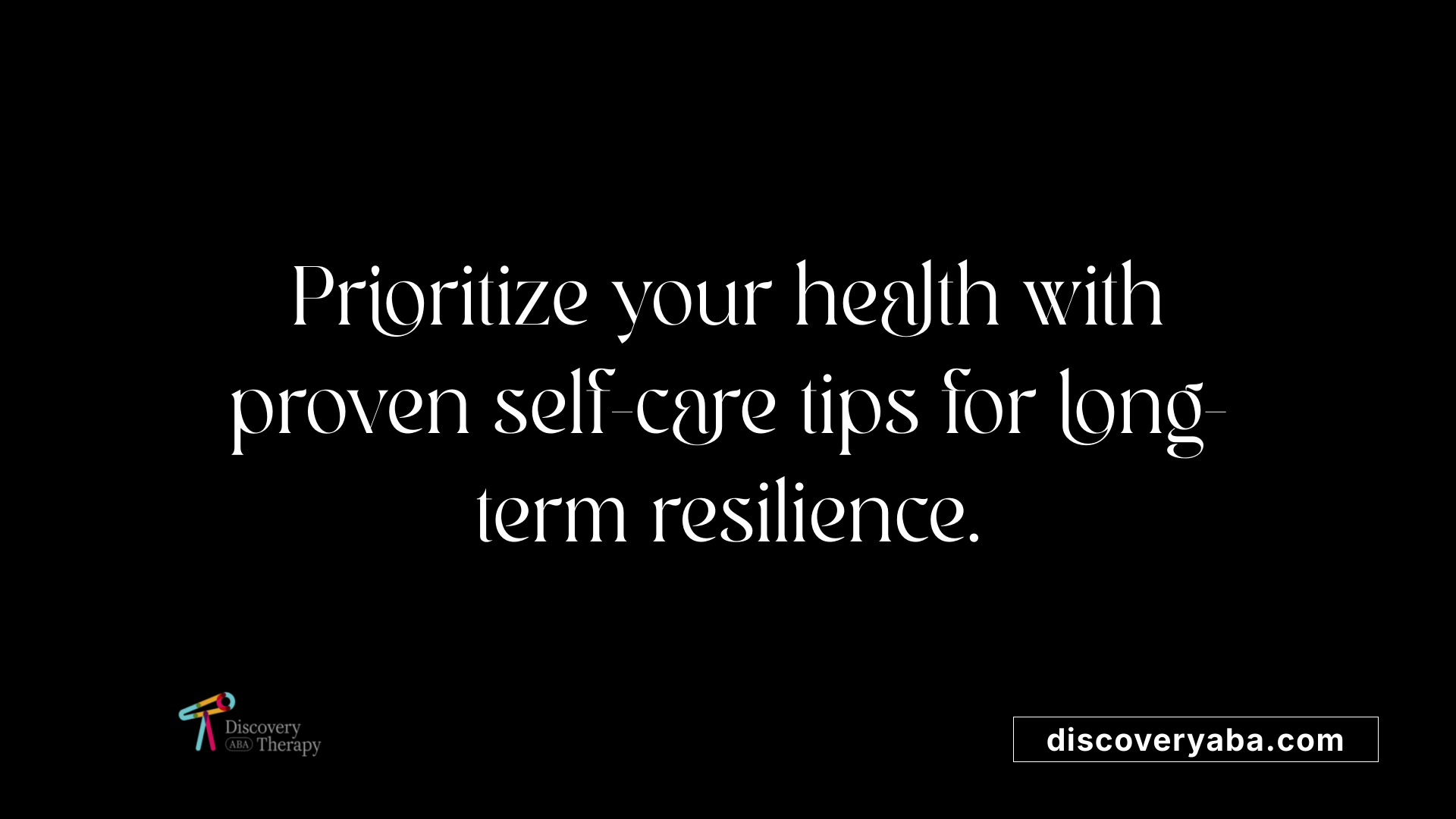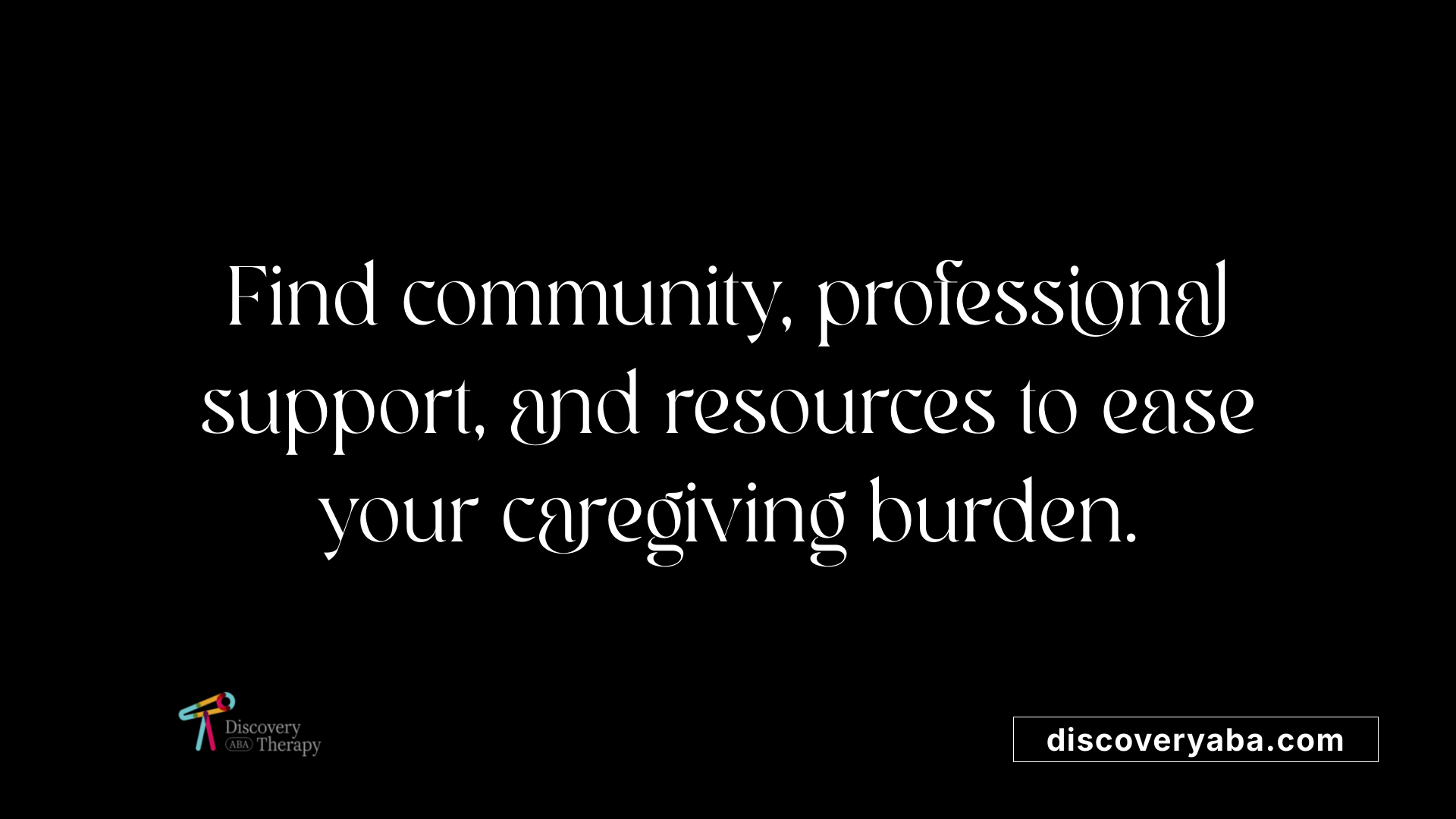Tips for managing caregiver stress during ABA therapy
Supporting Caregivers Through the Autism Journey

Understanding and Managing Caregiver Stress in ABA Therapy
Caring for a child with autism is a demanding journey that involves managing communication challenges, behavioral issues, and sensory sensitivities. While ABA therapy offers significant benefits for children, it also presents unique challenges for caregivers, often leading to burnout. Recognizing the signs, understanding the causes, and adopting effective coping strategies are critical steps toward maintaining caregiver well-being and ensuring the best support for the child.
Recognizing the Signs and Symptoms of Caregiver Burnout

What are the signs and symptoms of caregiver burnout during ABA therapy?
Caregiver burnout manifests through a variety of emotional, physical, and mental signs that can become more apparent during intensive therapies like ABA (Applied Behavior Analysis). One of the primary indicators is emotional exhaustion, where caregivers feel persistently drained and overwhelmed by their responsibilities.
Physically, burnout often results in chronic fatigue that doesn’t improve with rest. Caregivers may also experience irritability and emotional detachment, feeling distant from their child's progress or their usual support networks.
Sleep disturbances are common, including difficulty falling or staying asleep, alongside appetite changes that can lead to either overeating or loss of interest in food. Concentration becomes impaired, making it challenging to manage daily routines or follow through on therapy strategies.
Over time, these symptoms can contribute to increased health problems, such as frequent illnesses or worsening pre-existing conditions. Signs such as feelings of resentment, anger, guilt, or hopelessness might also appear, often accompanied by a sense of helplessness.
Notably, caregivers may feel emotionally numb or detached, which can affect their interactions with their child and others. These feelings not only impact their mental health but can also diminish the quality of care provided.
Recognizing these signs early is crucial. If symptoms persist, seeking support from healthcare professionals or support groups can help mitigate the effects of burnout. Addressing these issues promptly ensures caregivers maintain their well-being and can continue providing effective support for their children during therapy.
Understanding the Causes of Caregiver Stress in Autism Caregiving
 Caring for a child with autism often involves navigating a complex array of emotional demands. Many caregivers experience feelings of grief, helplessness, and ongoing worry about their child's development and future. These emotional burdens can be overwhelming, especially when combined with the daily responsibilities of managing behavioral and communication challenges.
Caring for a child with autism often involves navigating a complex array of emotional demands. Many caregivers experience feelings of grief, helplessness, and ongoing worry about their child's development and future. These emotional burdens can be overwhelming, especially when combined with the daily responsibilities of managing behavioral and communication challenges.
Autism frequently presents behavioral issues such as meltdowns, aggressive behaviors, and sensory sensitivities. Managing these behaviors requires constant vigilance and patience, which can lead to physical and emotional exhaustion. Communication difficulties further complicate caregiving, making it harder to understand and meet the child's needs during stressful situations.
Social isolation is another significant factor contributing to caregiver stress. Caregivers may find themselves withdrawing from social activities due to time constraints, difficulty explaining their child's behaviors, or fear of community misunderstanding. This lack of social support intensifies feelings of loneliness and emotional strain.
The demands of daily routines, including appointments for medical care and therapies like Applied Behavior Analysis (ABA), add to the pressures faced by caregivers. These repeated commitments require time, effort, and often financial resources, which can create a sense of being overwhelmed. Additional stressors include balancing work responsibilities and household chores.
Sociodemographic factors such as income level, education, and marital status can influence the degree of stress experienced. Lower income can limit access to respite care and support services, while lower educational levels may impact understanding of treatment options and coping strategies. Single parents or caregivers without a strong support network are often more vulnerable to burnout.
All these factors—emotional burdens, behavioral management challenges, social isolation, daily routine demands, and sociodemographic considerations—intersect to heighten caregiver stress levels. Recognizing these causes is crucial for developing effective support systems, including counseling, respite services, community education, and targeted resources, to help caregivers maintain their well-being and provide consistent care.
Practical Strategies for Coping with Stress in ABA Support

What strategies can caregivers use to cope with emotional and physical stress while supporting ABA therapy?
Supporting a child through ABA therapy can be rewarding yet demanding, leading to high stress levels for caregivers. To manage this, caregivers should adopt a combination of practical and emotional coping strategies.
First, gaining a thorough understanding of ABA techniques and autism can empower caregivers. Education about ABA methods helps them implement consistent strategies at home, which can reduce frustrations and improve the child's progress. This knowledge also enables caregivers to better anticipate and respond to challenging behaviors, making routines more manageable.
Practicing stress management techniques such as mindfulness, deep breathing, and relaxation exercises can significantly lower emotional and physical tension. Regular physical activity, proper nutrition, and sufficient sleep support overall health and resilience. Setting aside time for self-care activities—like hobbies or social interactions—can also rejuvenate emotional well-being.
Seeking social and professional support is essential. Joining caregiver support groups offers emotional comfort and practical advice from others facing similar challenges. Collaborating with therapists and educators allows caregivers to align strategies, track progress, and reduce feelings of isolation.
Finally, recognizing the importance of flexibility and cultural sensitivity ensures that support strategies are sustainable. By understanding their child's individual needs and respecting their own limits, caregivers can develop tailored approaches that promote resilience.
| Strategy | Description | Benefits |
|---|---|---|
| Education on ABA and autism | Learning about therapy approaches and autism traits | Increases confidence, consistency in support |
| Stress management techniques | Using mindfulness, relaxation exercises, and physical activity | Reduces emotional and physical tension |
| Support networks | Joining support groups and consulting professionals | Provides emotional support and practical tips |
| Self-care routines | Prioritizing sleep, nutrition, hobbies, and social interactions | Enhances emotional resilience and health |
| Individualized approaches | Adapting strategies to child's needs and cultural context | Improves effectiveness and sustainability |
Incorporating these strategies can help caregivers face the daily challenges of supporting their children with autism through ABA, reducing stress and fostering a more positive environment for everyone involved.
Self-Care Tips to Prevent and Manage Caregiver Burnout

What self-care tips are effective in preventing and managing caregiver burnout?
Caring for a child with autism can be demanding, making self-care essential for caregivers to stay resilient. Prioritizing physical health by maintaining a routine of regular exercise, eating nutritious meals, and ensuring sufficient sleep helps sustain energy levels and overall well-being.
Building a support network is equally important. Connecting with family, friends, support groups, and professionals provides emotional backing and distributes caregiving responsibilities, alleviating feelings of isolation.
Taking breaks and using respite care services give caregivers necessary time to recharge. These moments allow caregivers to focus on their own needs, reducing stress and preventing burnout.
Engaging in joyful activities and practicing mindfulness are effective ways to cultivate emotional resilience. Activities like hobbies, relaxation exercises, or meditation help manage anxiety and promote mental health.
Setting boundaries and recognizing personal limits enable caregivers to conserve their energy. Learning to say no when overwhelmed and respecting one's physical and emotional signals prevents exhaustion.
In addition to these strategies, seeking professional support, educating oneself about autism and available therapies, and maintaining positive relationships strengthen coping mechanisms.
Consistently practicing these self-care routines based on fundamental needs creates a balanced lifestyle that supports caregivers' health and their ability to provide effective care. This proactive approach is vital to sustain long-term caregiving and preserve family stability.
Resources and Support Options for Caregivers Facing Stress

What support networks and community options are available for caregivers experiencing stress?
Caregivers of children with autism often navigate through overwhelming responsibilities, which can lead to significant stress. Support groups and online communities are crucial resources that offer emotional reassurance, practical advice, and a sense of community. Local chapters of organizations like the Autism Society provide in-person meetings and resources, fostering peer connections. Online platforms such as My Autism Team and Autism Speaks' Autism Response Team are accessible from home, allowing caregivers to share experiences, seek advice, and find comfort.
Community programs focused on respite care give caregivers much-needed breaks, offering short-term relief while children receive attention and support in safe environments. These programs also promote social interactions for children which can lessen behavioral struggles and improve social skills. Educational and advocacy organizations supply essential materials that help families understand autism and manage daily challenges more effectively.
What resources and support options are available for caregivers experiencing stress during autism therapy?
Caregivers under significant stress can benefit from a broad spectrum of support and resources. Support groups—whether local or virtual—provide emotional outlets and shared experiences, reducing feelings of isolation. Online forums and national organizations like Autism Speaks offer tailored advice and support networks that empower caregivers.
Professional counseling services are also vital. Therapists specializing in caregiver burnout can help manage emotional strains, resilience-building, and stress reduction techniques. Respite care services give caregivers temporary relief, enabling them to attend to personal health or leisure activities.
Educational materials are fundamental, such as the "100 Day Kit for Newly Diagnosed Families" or various parent handbooks, which guide caregivers through initial diagnosis, therapy options, and self-care strategies.
Specialized medical and educational services—provided through reputable centers like the Kennedy Krieger Institute—assist in developing individualized treatment plans, offering both children’s and caregivers’ support. This holistic approach ensures that both the child's developmental needs and the caregiver's well-being are prioritized.
Connecting with healthcare providers, advocacy groups, and online communities helps reduce feelings of isolation, offers practical strategies, and enhances the caregiver’s ability to manage stress. These resources collectively support caregivers in maintaining their health, resilience, and the overall stability of their families during demanding times.
Harnessing Mindfulness and Relaxation to Reduce Stress

How can mindfulness and relaxation techniques help caregivers manage stress?
Mindfulness and relaxation methods offer powerful tools for caregivers feeling overwhelmed by the responsibilities of raising a child with autism. These techniques help promote calmness, reduce anxiety, and lower the risk of burnout. When caregivers take just a few minutes daily—often around 5 to 10—they can practice deep breathing exercises, meditation, or muscle relaxation to foster mental and physical relaxation.
Implementing these practices increases awareness of one’s emotional state, which is crucial for managing stress effectively. They also encourage reflection and self-regulation, helping caregivers develop a positive outlook and reduce ruminative or negative thoughts. For example, programs like Mindfulness-Based Stress Reduction (MBSR) have shown that consistent practice can significantly diminish symptoms of anxiety and depression, while improving overall mental health and resilience.
Parents and caregivers can incorporate mindfulness seamlessly into daily routines by mindful breathing during breaks, taking moments for gratitude, or engaging in guided imagery during stressful moments. Building these habits enhances emotional resilience, allowing caregivers to better handle behavioral challenges, medical schedules, and sensory sensitivities.
In addition to individual practice, integrating mindfulness into family activities, seeking support groups, and even consulting mental health professionals can bolster coping strategies. As a result, caregivers not only manage their stress more effectively but also improve their ability to support their child, fostering a healthier family environment overall.
The Importance of Patience and Managing Expectations in Long-Term Therapy

Why is long-term commitment to ABA important?
Applied Behavior Analysis (ABA) therapy is not a quick fix; it’s a gradual process that often extends over months or years. Consistency and dedication are essential because behavioral changes, social skills, and communication improvements happen step by step. Caregivers should view ABA as an ongoing journey requiring patience and perseverance.
How do you manage caregiver and child's expectations?
Setting realistic goals is vital. While improvements are common, they may develop slowly and vary between children. Open communication with therapists helps families understand what to expect and how to celebrate small victories along the way. Recognizing progress—even if minor—keeps motivation high and reduces frustration.
How can building resilience and patience help?
Creating a resilient mindset allows caregivers to stay committed despite setbacks. Patience helps navigate the challenges, like managing challenging behaviors or dealing with slow progress. Developing these qualities ensures a supportive environment for children and helps reduce caregiver stress.
Why is tracking progress and adjusting strategies crucial?
Regularly monitoring your child's development through journaling or therapy reports offers valuable insights. This documentation helps identify what works and what doesn’t. With this information, caregivers can work with therapists to modify strategies, ensuring interventions remain effective and aligned with the child’s evolving needs.
| Aspect | Focus | Additional Details |
|---|---|---|
| Long-term commitment | Consistency | Ongoing effort over months or years to see meaningful change |
| Managing expectations | Realism | Understand that progress varies; celebrate small achievements |
| Building resilience | Emotional strength | Helps caregivers maintain patience and reduce burnout |
| Tracking progress | Observation | Use logs and regular updates to inform adjustments |
| Adjusting strategies | Flexibility | Collaborate with therapists to modify approaches as needed |
By embracing patience and managing expectations, caregivers can better support their child’s growth while maintaining their own well-being. Long-term success depends on consistent effort, adaptability, and a positive outlook.
Moving Forward with Caregiver Resilience
Supporting caregivers through the intensive journey of ABA therapy involves recognizing the signs of burnout, understanding its causes, and implementing practical, sustainable coping strategies. Leveraging resources, building a strong support network, practicing mindfulness, and prioritizing self-care are essential steps to prevent and manage stress. Maintaining patience and realistic expectations helps in navigating the long-term nature of ABA therapy, fostering resilience and ensuring the well-being of both the caregiver and the child. Remember, taking care of yourself is not a luxury but a necessity in providing the best possible support for your child's developmental journey.
References
- Managing Caregiver Burnout: The Impact Of Autism On Parents
- Overcoming Common Challenges in ABA Therapy: Tips for Caregivers
- Caregiver Burnout: 6 Incredible Preventing Strategies
- Pivoting: Balancing Self-Care While Caring for Your Autistic Child
- Tips to Overcome Caregiver Burnout & Reduce Stress
- Caregiver burden among caregivers of children with autism ...
- Understanding stress in parents of children with autism spectrum ...
- The Silent Battle: Caregiver Mental Health in the Realm of Autism
- Caregiver Burnout: Why Self-Care Is Essential to Parenting
- Caring for the caregiver | Autism Speaks
Does Your Child Have An Autism Diagnosis?
Learn More About How ABA Therapy Can Help
Find More Articles
Contact us
North Carolina, Nevada, Utah, Virginia
New Hampshire, Maine
Arizona, Colorado, Georgia, New Mexico, Oklahoma, Texas
.avif)




































































































